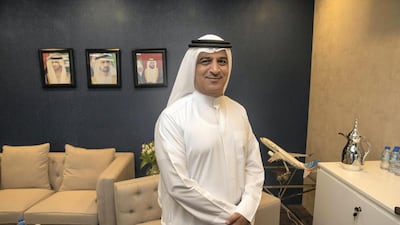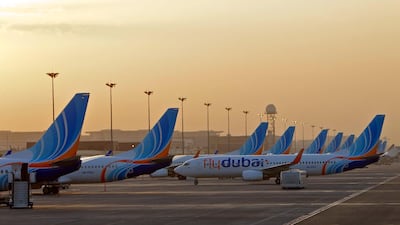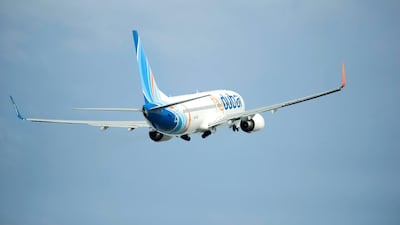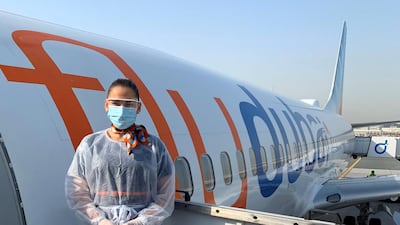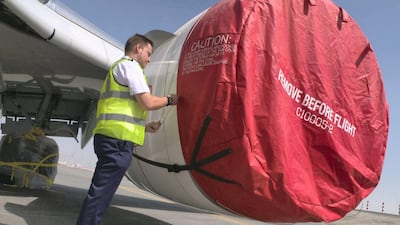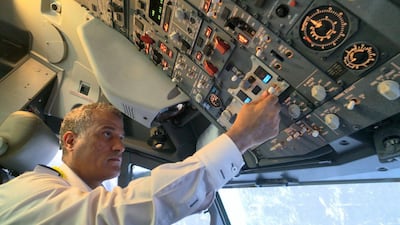Flydubai has asked staff furloughed during the Covid-19 pandemic last year to return to work from June amid rising optimism about a rebound in summer travel.
The airline wrote to affected workers last week and gave them “a schedule to start coming back", chief executive Ghaith Al Ghaith told aviation consultant John Strickland during an online session at the Arabian Travel Market conference on Tuesday.
"[These are] all the people who were on unpaid leave,” he said. “That was a huge satisfaction from our side that we can bring back people.”
The Covid-19 pandemic hit the aviation industry hard, forcing airlines around the world to preserve cash by grounding aircraft and laying off or furloughing employees.
Flydubai had offered its staff the option of either unpaid leave or redundancy. About 97 per cent of affected staff chose to go on unpaid leave, said Mr Al Ghaith.
“I understand part of it is because people have no other choice... but it was a commitment from the people that they wanted to stick with the airline and we stuck with them,” he said.
In its 2020 annual earnings report, flydubai said 1,092 of its 3,796 workers went on unpaid or voluntary leave. The airline's workforce shrank by 3.2 per cent last year, compared with the previous year, it said.
The state-owned airline worked with regulatory authorities and partners to support staff on unpaid leave, said Mr Al Ghaith.
It teamed up with banks to provide relief such as loan repayment holidays to its affected employees.
“We tried to work out some of their problems because ... for a lot of people who work for us, the UAE is their second home,” he said.
“The feedback we got during this terrible time of how people valued what we have done was so encouraging. That made us so proud that we can do even more. This is a very big exercise to build people’s loyalty to the brand.”
Flydubai is upbeat about this year’s summer travel period. Before flights to India, Pakistan and Nepal were halted, the airline had reached more than 65 per cent of its pre-crisis capacity, said Mr Al Ghaith.
“We are very optimistic that with the summer coming up, things ... will be even better,” he said, noting this would depend on the travel restrictions of other countries.
“The biggest question will be which countries will be open. We are open here and ready for business in the UAE and the airline is ready.”
The budget airline has already revealed new summer routes to tap into pent-up travel demand.
It said yesterday that it will start flying to the Greek islands of Santorini and Mykonos, Bodrum and Trabzon in Turkey, Naples in Italy and Salzburg in Austria in the next two months.
Flydubai is currently using 10 of its 14 Boeing 737 Max aircraft after the UAE aviation regulator approved the jet’s return to the skies in January.
“We have opened new destinations ... that probably we would have not flown to, but because these are opportunities presented to us [through the 737 Max’s return]. There will be more of these opportunities,” said Mr Al Ghaith.
He said there is “huge potential” to deepen its existing partnership with sister company Emirates.
“With Emirates, we have a huge opportunity to work together,” said Mr Al Ghaith.
The two Dubai government-owned airlines co-ordinated before the pandemic on “basic” elements such as code-sharing and schedules.
They also reduced layovers and moved flydubai flights closer to Emirates at Dubai International airport's Terminal 3.
This gave the airlines a “huge business opportunity and this will continue”, he said.
Emirates and flydubai will remain separate brands while forging closer ties, he said, echoing comments by Emirates airline president Tim Clark's this week.
“Right now, the objective is to work as two separate airlines but that does not mean we cannot grow together,” said Mr Al Ghaith. “There is huge potential.”
